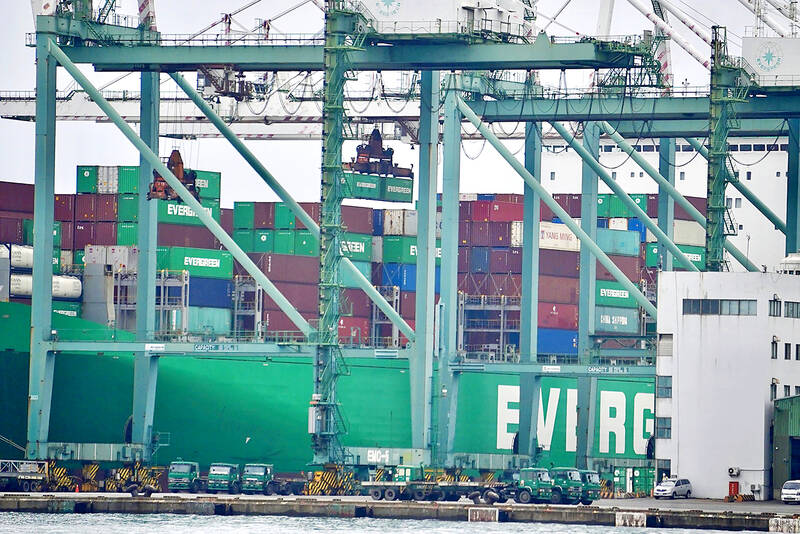Industrial production last month expanded 13.42 percent from the same period last year, propelled by strong demand for electronic components used in artificial intelligence (AI), high-performance computing and Web-based data centers, the Ministry of Economic Affairs said yesterday.
The index, which came in at 103.27, rose for a sixth consecutive month, Department of Statistics Deputy Director-General Huang Wei-jie (黃偉傑) said, attributing the increase to restocking demand for new technology product launches and aggressive spending by US technology giants to develop AI applications.
The momentum is sustainable, but would slightly slow down this month, as some non-tech firms struggle on and others opt for maintenance inspections, the official said, citing the ministry’s monthly survey.

Photo: CNA
The industrial output of the electronics sector surged 22.24 percent to a new record, as high-performance computing and AI applications gained popularity, bolstering demand for semiconductors, motherboards, chip testing and packaging, and printed circuit boards, the ministry said.
The uptick came even though sales of large flat panels faltered, in line with slowing demand for TV sets, it said.
The industrial production of computer and optical products spiked 42.56 percent to a new peak on the back of robust sales of high-end servers and AI-related products.
The launch of new-generation smartphones, laptops, wearables and peripheral products by major technology brands served as further catalysts, it said.
Non-tech products floundered, with the output of base metal products shrinking 4.4 percent from a year earlier, chemical products dipping 4.51 percent and auto parts slumping 12.87 percent, the ministry said.
The poor performance stemmed from slack end-market demand and capacity adjustments induced by a global economic slowdown, in addition to a low comparison base last year, it said.
The US, Europe and China all showed signs of economic weakness, boding ill for Taiwan’s export-reliant economy.
Auto parts used in gasoline-powered vehicles have taken a further blow from electric vehicles, as environmental awareness increases, the ministry said.
Industrial production for the first eight months of the year gained 10.98 percent from the same period last year, the ministry said.
Meanwhile, a survey of manufacturers showed that a majority, or 73.5 percent, expect business to remain stable this month, 9.2 percent expect a pickup and 17.3 percent project a decline.
In terms of production value, 87.1 percent expect steady output, 5 percent forecast an upturn and 7.9 percent predict a retreat, the survey showed.

Greek tourism student Katerina quit within a month of starting work at a five-star hotel in Halkidiki, one of the country’s top destinations, because she said conditions were so dire. Beyond the bad pay, the 22-year-old said that her working and living conditions were “miserable and unacceptable.” Millions holiday in Greece every year, but its vital tourism industry is finding it harder and harder to recruit Greeks to look after them. “I was asked to work in any department of the hotel where there was a need, from service to cleaning,” said Katerina, a tourism and marketing student, who would

i Gasoline and diesel prices at fuel stations are this week to rise NT$0.1 per liter, as tensions in the Middle East pushed crude oil prices higher last week, CPC Corp, Taiwan (台灣中油) and Formosa Petrochemical Corp (台塑石化) said yesterday. International crude oil prices last week rose for the third consecutive week due to an escalating conflict between Israel and Iran, as the market is concerned that the situation in the Middle East might affect crude oil supply, CPC and Formosa said in separate statements. Front-month Brent crude oil futures — the international oil benchmark — rose 3.75 percent to settle at US$77.01

Merida Industry Co (美利達) has seen signs of recovery in the US and European markets this year, as customers are gradually depleting their inventories, the bicycle maker told shareholders yesterday. Given robust growth in new orders at its Taiwanese factory, coupled with its subsidiaries’ improving performance, Merida said it remains confident about the bicycle market’s prospects and expects steady growth in its core business this year. CAUTION ON CHINA However, the company must handle the Chinese market with great caution, as sales of road bikes there have declined significantly, affecting its revenue and profitability, Merida said in a statement, adding that it would

UNCERTAINTIES: The world’s biggest chip packager and tester is closely monitoring the US’ tariff policy before making any capacity adjustments, a company official said ASE Technology Holding Inc (日月光投控), the world’s biggest chip packager and tester, yesterday said it is cautiously evaluating new advanced packaging capacity expansion in the US in response to customers’ requests amid uncertainties about the US’ tariff policy. Compared with its semiconductor peers, ASE has been relatively prudent about building new capacity in the US. However, the company is adjusting its global manufacturing footprint expansion after US President Donald Trump announced “reciprocal” tariffs in April, and new import duties targeting semiconductors and other items that are vital to national security. ASE subsidiary Siliconware Precision Industries Co (SPIL, 矽品精密) is participating in Nvidia